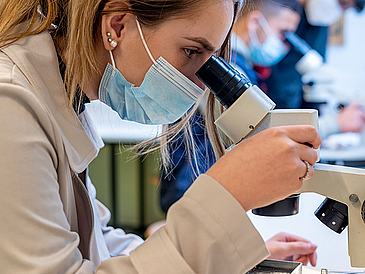Everything is interconnected: atmosphere and oceans, glaciers and deserts, flora and fauna. In the MARUM UNISchullabor, students learn how it all works. And they learn not only theoretically, but also in practice through experiments that they themselves prepare, observe, analyze, and finally discuss with one another.
“We are building on the knowledge and experience that the students have and are making connections that expand outward from the center and becoming more comprehensive, like concentric circles,” says Dr. Martina Pätzold, head of the MARUM UNISchullabor for the past 17 years. Thematically, Martina Pätzold maintains a close alignment with the University of Bremen’s high-profile scientific area of “Marine, Polar and Climate Research,” which is coordinated at MARUM – Center for Marine Environmental Sciences. Its members support the MARUM UNISchullabor with courses in their areas of expertise.
The MARUM UNISchullabor was established 20 years ago as a bridge between the Universum Science Center as a practical location and the university, originally focusing on high-school students. Its goal was to arouse their interest in the natural science fields using lectures as a vehicle. Lectures are now a thing of the past, and the clientele has become much younger. The children who come to the School Lab now come from the last year of kindergarten through the primary and middle-school levels.
More Space for Playful Learning in the Lab
To help them learn about the interrelationships and cycles of our planet in a relaxed way, the students now have more space in the new rooms of the School Lab, and do not have to change between different laboratories on the campus. The new rooms, which include a fully outfitted student laboratory and an outside area, make this all possible. The preparations for this took three years, during which Martina Pätzold taught either on field trips – for example to the Wadden Sea – or directly in the schools.
Pätzold always keeps an eye on the curriculum, which includes the water cycle, for example. What happens when ice melts or the oceans warm up? “We are really filling a void here,” says Pätzold. Theory is taught in the school and then the classes come to her to carry out experiments. In addition to the water cycle, the groups are also learning about the rock cycle, types of renewable energy, and investigations related to climate. The course content is individually tailored to the level of the class, their previous knowledge, and the profile of the school, so that the guests can always work in an interactive and application-oriented environment, and thus learn independently. The educators also appreciate this, says Pätzold. “Although we lead the courses, the teachers are always involved. This gives them the chance to observe and get to know their groups in a different way outside of the school setting.”
“Offers Strengthen the STEM Area”
“Two points in particular speak in favor of the new MARUM UNISchullabor,” says Frauke Meyer, Director of Administration and Finance at the University of Bremen. “The expanded program strengthens the university's STEM area, and a future generation of students is introduced to natural sciences in a more playful way."
Prof. Michael Schulz, Director of MARUM, stresses that; “Programs for schools will continue to be a central activity of MARUM. We want to provide young people with knowledge about climate change, and show them ways they can act more sustainably.”
The new rooms on the Boulevard of the university are also the home of the climate project “Klima – Ich wandle mich” (Climate – I’m Changing), in which four project schools in the state of Bremen are working on the topic of climate protection and sustainability. A virtual program called MINT-Box (“MINT” is the German term for “STEM”) is currently being developed for educators to bundle courses, use the rooms, and develop new content for students.
Further Information:
Home page of the MARUM UNISchullabor (in German only): https://www.marum.de/Entdecken/MARUM-UNISchullabor-2.html
Contact:
Dr. Martina Pätzold
Head of MARUM UNISchullabor
Phone: +49 421 218-65530
Email: mpaetzoldprotect me ?!marumprotect me ?!.de
Ulrike Prange
MARUM Press and Public Relations Office
Phone: +49 421 218-65540
Email: medienprotect me ?!marumprotect me ?!.de

